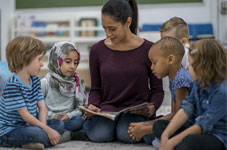Joan K. Blaska Collection
About the Blaska Collection
The Joan K. Blaska Collection of Children’s Literature contains more than 500 books, with new books added each year. Dr. Blaska, who retired in 2001 from St. Cloud State University, donated her collection to the university. The books are part of St. Cloud State University Library Collection.
The Blaska Collection consists of children’s picture books with characters who have disabilities or chronic illnesses, written for children from preschool through third grade. These books give children the opportunity to begin to understand the diversity of human ability much as they develop awareness of cultural diversity from books.
Dr. Blaska believes that if children begin the process of learning about disability and illness during their early years, children will build stronger understanding of disabilities. When children with this early learning meet someone with a disability or illness, their prior knowledge and understanding will help them do a better job relating to the person rather than to the person’s disability or illness.
About Joan K. Blaska
Dr. Blaska was a professor at SCSU for 18 years, teaching in the Department of Child and Family Studies. She trained students to work with young children with and without disabilities. Dr. Blaska was concerned that books with characters with disabilities and illnesses were not being incorporated into curricula in early childhood programs. During a sabbatical, she researched this genre of literature, locating books and outlining strategies on how to use the books. She incorporated her research findings into her book: Using Children’s Literature to Learn about Disabilities and Illness (2nd Ed. Educator’s International Press, 2003.) Dr. Blaska is retired and has donated her collection to University Library so teachers, and students preparing to be teachers, may use the books in their training and continue teaching children about disabilities. You may contact her at jkblaska@stcloudstate.edu.
Donating to the Collection
University Library and Dr. Blaska welcome the donation of funds to build the Blaska collection. A bookplate with the donor’s name will be places inside the cover of each book purchased with a donation. You may make donations in memory of a special person and that person’s name will be included on the bookplate.
Fund information:
- Fund name: Joan K. Blaska Book Fund
- Fund #: 310-205-15105
You can donate by credit card, mail or phone.
Images and Encounters Profile
Dr. Blaska and a colleague, Dr. Lynch, developed the following profile to help you review children’s literature that features characters with disabilities. If you read each book with these criteria in mind, you will be more aware of the strengths and weaknesses of each story, which will help you make good choices on how to use each book.
For each item, indicate whether you believe the criteria are present or not present in the story line, language, or illustrations. Answer YES if the criterion was addressed positively, answer NO if the criterion was addressed negatively, and answer NP if the criterion was not present. The greater the number of YES responses, the better the book is at presenting disabilities. Be aware of your NO responses when reading or discussing the books. Negative responses may influence how you choose to use the book.
- Promotes empathy, not pity
- Depicts acceptance, not ridicule
- Emphasizes success rather than, or in addition to, failure
- Promotes positive images of people with disabilities
- Assists children in gaining an accurate understanding of the disability
- Demonstrates respect for people with disabilities
- Promotes an attitude of “one of us,” not “one of them”
- Uses language which stresses person first, disabilities second (Jody, who is blind)
- Realistically describes the disability or person with disabilities (not subhuman or superhuman)
- Illustrates characters in a realistic manner
When in doubt about using a particular book which includes a person with a disability, ask yourself, “Would this story embarrass or humiliate a child with a disability?” If the answer is “yes,” consider carefully how best to use this book.
(Blaska & Lynch, 1994)
